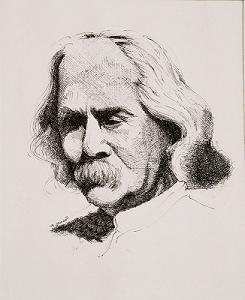Poems by Mehdi Akhavan-Sales/ Bejan Baran

THE EXCUSE
Yes, you are that which the heart desires.
But,
alas!
It is a long time since that bloody pigeon,
the searcher of the lost enchanted tower, has flown.
THE NURSE
It is a night of autumn nights-
one of those, sympathetic and kind to me, suspicious night-
woeful and heavy-hearted, weeping and lengthy.
The night, which I suspect either, weeps on my night, with such sympathy,
or weeps on my morning, also in secret from me.
I am telling it and the night is going on.
Silent and kind to me
like an antecedent black-dressed nurse, who has given up the patient-
sitting by my side, the night weeps.
I say these words and the night goes on.
THE FLOWER
The same color, the same face
the same leaves, the same stem
the same silent smile with many hidden secrets
the same shame, the same charm
the same white petal as dew, the dew as a falling tear
the same appearance and look.
Neither wilts
nor withers- for the wilt of face
is caused by the wither of heart.
But there is no heart behind this face.
If there are leaves and a stem,
they are not the product of water and soil.
View from afar.
Display this sight and sit to observe.
But the tale of perishable hope, your heart has- never tell.
Do not smell.
For there will be no fragrance from such a tale.
Do not stretch out your hand.
For there will be but colored paper in your hand, a few pieces.
Biography of Mehdy Akhavan-Sales
1928 Born, Mashad,Iran
1950 Married Iran; later had 4 children
1951 The Organ, poems
1954 Jailed
1956 The Winter, poems
1959 The End of Shahnameh, poems
1966 From This Avesta, poems; The Hunt, a long verse
1969 The Autumn In Prison, The Lovely & The Purple, Omid's Best, all poems
1970 Collection of Articles, poetics
1981 Retired without pension
1990 Traveled to Germany. Returned to Iran, died, buried by Ferdowsi, Mashad
From his prose: "1 am the slave of instant." "Every meaning that comes to a poet's mind seeks its own form, and automatically, it finds it." "Poetic dress includes symbols, allegories, and metaphors." "Thought and content supersede form and style." "Rhyme has no natural implication in poetry, it is only for ornamentation." "Meter, regardless of vowels and consonants, has shifts in space and time." "An artist is one of the most sensitive branches on the tree of humanity." "A human who is a poet in any society and at any time has responsibilities and obligations to that society and to that time." "When you are familiar with and are able to communicate with the near man, you will know the far one, too." "To flow and to be free are better than to be logical." "One cannot say his own words using another's language." "Gradually I noticed some of the social problems.” “The connotation of open expression leads to an unbalanced and complex language.” "If you have precise and delicate feelings, your diction will be precise." "Poetry is not, has not been and will not be everybody's." "The role of poetic language is great, moreover, it is the totality of the work.” “When the domain of poetry is wide, the range of words is wide, too." "The audience must be accounted for." "Be correct and precise [in language]." "A new aesthetic system has its difficulties."
Akhavan-safes represents the combination of poet and scholar in a more striking degree than any other, with a thorough training in Arabic and antiquarian. Classical Poetry is his special field and a most astounding technical skill enabled him to reproduce in the New Poetry the complex classical diction and rhythm with their intricate harmony. He is a tempered objective observer who strongly leans toward nationalistic ideals- with all the homely virtues of his ancestry. His conservatism is more deliberate than it is instinctive. He uses the old forms with taste and discretion because they belong to the past not because they serve any definite function. He knows more about verse than to believe that the easiest verse is necessarily the best one. His mastery of word music stems from his early training in music (playing tar). His extensive use of propositions softens his poems and reduces the amount of information per line in his poems. Looking around for innocent forgotten and heroic subjects and falling under the archaic diction, he employs suitable language and form. But he is as passionate as he is honest. He neither understates from irony nor overstates from rhetoric. Every word is the right word in the proper place and yet the effect is never of artifice but always of spontaneity in itself. He is interested in public events of his own day as well as in the past. He pretends to be a sturdy commoner and always retains a certain affinity with the mass. Traditional meters assume new life in his poetry. In every one of his poems the rhythm is unmistakably personally his own. There is an epic narrative element in his poetry. It is not, on the whole born of his experiences but his studies. His feelings rapture; and tears are born of reflection.
....
send by; Bejan Baran